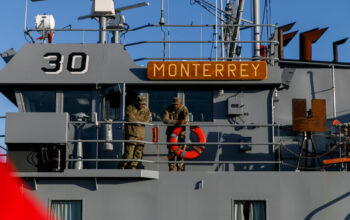
President Volodymyr Zelensky of Ukraine encouraged Russians to resist their country’s conscription drive on Saturday, his latest effort to blunt President Vladimir V. Putin’s attempts to broaden the war.
“It is better to surrender to Ukrainian captivity than to be killed by the strikes of our weapons, absolutely fair strikes, as Ukraine defends itself in this war,” he said in Russian-language comments on his Telegram account. “We defend the brightest — we defend our lives, our children, our freedom. What is Russia fighting for?”
President Putin ordered the call-up on Wednesday of 300,000 civilians to bolster Russia’s forces in Ukraine, where they have faced sharp setbacks in recent weeks, losing large areas they had captured over the summer as a Ukrainian counterattack in the northeast set off a rapid retreat. Some Russian news outlets have reported that the mobilization could be even larger than officials first disclosed.
Mr. Zelensky has tried to fuel that resistance. On Friday he called on the residents of Russian-held parts of eastern Ukraine to fight Russian mobilization efforts. Those who cannot avoid being pressed into service should try to sabotage Russia’s military efforts, he added.
On Saturday he broadened that call to Russia, saying the potential penalties for avoiding the draft are far better than being injured or killed fighting in an unjust war.
“It is better not to take a conscription letter than to die in a foreign land as a war criminal,” Mr. Zelensky said. “It is better to run away from criminal mobilization than to be crippled and then bear responsibility in the court for participating in the war of aggression.”
Mr. Zelensky has previously made direct appeals to Russian civilians and soldiers, trying to fan the doubts that some have expressed about the invasion.
On Saturday he promised that any Russian soldier who surrendered to Ukrainian forces would be treated humanely according to international conventions. The circumstances of such surrenders would not be revealed to the Russian side, so no one would know if it was voluntary, he said.
“If you are afraid to return to Russia and do not want an exchange, we will find a way to ensure this as well,” he added.



